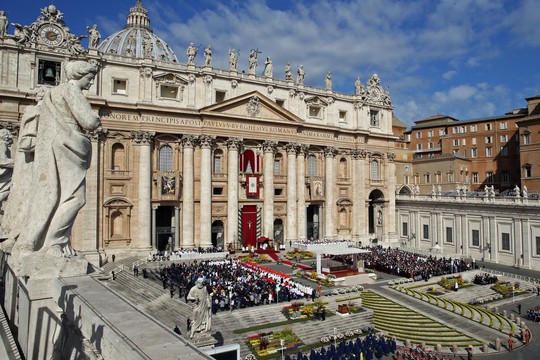Vatican
Pope Francis has staked a position on the war in Ukraine that puts him more in line with Beijing, New Delhi, and Brasília than Washington, London, or Brussels: He wants to end Ukraine’s armament by the West and negotiate an immediate cease-fire. Earlier this week, Francis vaguely alluded to a mission he was working on to end the conflict. Yet he seems to have alienated many of the actors whose support he would need to do so, writes “The Atlantic”.
Still, Francis’s actions are neither arbitrary nor irrational. They are a deliberate response to how the Catholic Church is changing — and will continue to change — in the 21st century. More Catholics than ever before live outside the West and don’t see the war in Ukraine on the same terms as Europe and the United States do. Understood in this light, Francis’s position previews the future of the Church as a geopolitical force, one that will be far less acquiescent to the West.
Western leaders have any number of reasons to be upset with Francis’s response to the war. In addition to criticizing the West’s efforts to arm Ukraine, he has implied that NATO deserves blame for the invasion, often quoting an unnamed diplomat who accused NATO of “barking at Russia’s door.”
Though Francis has condemned Russian war crimes and sympathized with Ukrainians’ suffering, he hasn’t condemned Vladimir Putin. Rather, Francis has praised him as a man of culture and even suggested that the Russian president has been acting on legitimate security concerns.
This represents a dramatic break with the Vatican’s traditional philosophy. Historically, the Holy See has practiced what academics call the “great power” model of diplomacy, attaching itself to the superpower of the day. Over the centuries, that’s meant de facto alliances with the Holy Roman Empire, the French monarchy, and the Austro-Hungarian empire. For most of the 20th century, Rome attached itself to Western powers, so much so that Pope Pius XII, the pope during the Second World War and a ferocious anti-Communist, was dubbed “the chaplain of NATO.”
No modern pope has practiced great-power diplomacy as effectively as John Paul II. He was one of the most consequential leaders on the planet — not merely a spiritual figure, but a political one. Accumulating such influence would have been unthinkable without the West’s support.
The contrast between John Paul’s outsize role in global affairs and Pope Francis’s role in them today is hard to overstate.
As Francis completed his tenth year as pope in March, a contest between Russia and the West was once again being waged on a proxy site in Eastern Europe. Now, however, the pope is at odds with Western powers, instead of operating in concert with them.
Francis has embraced what might be seen as the Vatican’s first multipolar geopolitical strategy. Instead of hewing to the Western consensus, Francis has sought nontraditional allies in his pursuit of a solution in Ukraine, such as Hungary’s prime minister, Viktor Orbán, in part to avoid antagonizing Russia.
In this vein, the pope and his top aides have called for a 21st-century version of the Helsinki process, a diplomatic effort to reduce tensions during the Cold War that brought together a diverse set of Eastern and Western nations.
As the first pope from Latin America, Francis came into office feeling the same ambivalence about the United States and the other Western powers as many Latin American leaders, given America’s history of interference in the region.
But the principal reason is demographic. In 1900, there were roughly 267 million Catholics in the world, more than 200 million of whom were in Europe and North America. By 2000, there were nearly 1.1 billion Catholics in the world, but only 350 million of them were Europeans and North Americans.
The overwhelming majority, 720 million, lived in Latin America, Africa, and Asia. More than 400 million lived in Latin America alone. By 2025, only one in five Catholics will be a non-Hispanic.
This is the most rapid, and most sweeping, demographic transformation of Roman Catholicism in its 2,000-year history…
The Vatican is always slow to respond to such changes. As the old saying goes, if you hear that the end of the world is coming, head for Rome, because it will get there last. Francis’s papacy — and his position on Ukraine in particular — represents the beginning of the Church’s pastoral and political expression of its new demographic realities.
read more in our Telegram-channel https://t.me/The_International_Affairs

 12:03 12.05.2023 •
12:03 12.05.2023 •























